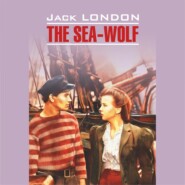По всем вопросам обращайтесь на: info@litportal.ru
(©) 2003-2024.
✖
Brown Wolf and Other Jack London Stories
Настройки чтения
Размер шрифта
Высота строк
Поля
"Back into that awful Klondike world of suffering?"
He nodded and added: "Oh, it ain't so bad as all that. Look at me.
Pretty healthy specimen, ain't I!"
"But the dogs! The terrible hardship, the heart-breaking toil, the starvation, the frost! Oh, I've read about it and I know."
"I nearly ate him once, over on Little Fish River," Miller volunteered grimly. "If I hadn't got a moose that day was all that saved 'm."
"I'd have died first!" Madge cried.
"Things is different down here," Miller explained. "You don't have to eat dogs. You think different just about the time you're all in. You've never been all in, so you don't know anything about it."
"That's the very point," she argued warmly. "Dogs are not eaten in California. Why not leave him here? He is happy. He'll never want for food – you know that. He'll never suffer from cold and hardship. Here all is softness and gentleness. Neither the human nor nature is savage. He will never know a whip-lash again. And as for the weather – why, it never snows here."
"But it's all-fired hot in summer, beggin' your pardon," Skiff Miller laughed.
"But you do not answer," Madge continued passionately. "What have you to offer him in that northland life?"
"Grub, when I've got it, and that's most of the time," came the answer.
"And the rest of the time?"
"No grub."
"And the work?"
"Yes, plenty of work," Miller blurted out impatiently. "Work without end, an' famine, an' frost, an' all the rest of the miseries – that's what he'll get when he comes with me. But he likes it. He is used to it. He knows that life. He was born to it an' brought up to it. An' you don't know anything about it. You don't know what you're talking about. That's where the dog belongs, and that's where he'll be happiest."
"The dog doesn't go," Walt announced in a determined voice. "So there is no need of further discussion."
"What's that?" Skiff Miller demanded, big brows lowering and an obstinate flush of blood reddening his forehead.
"I said the dog doesn't go, and that settles it. I don't believe he's your dog. You may have seen him sometime. You may even sometime have driven him for his owner. But his obeying the ordinary driving commands of the Alaskan trail is no demonstration that he is yours. Any dog in Alaska would obey you as he obeyed. Besides, he is undoubtedly a valuable dog, as dogs go in Alaska, and that is sufficient explanation of your desire to get possession of him. Anyway, you've got to prove property."
Skiff Miller, cool and collected, the obstinate flush a trifle deeper on his forehead, his huge muscles bulging under the black cloth of his coat, carefully looked the poet up and down as though measuring the strength of his slenderness.
The Klondiker's face took on a contemptuous expression as he said finally: "I reckon there's nothin' in sight to prevent me takin' the dog right here an' now."
Walt's face reddened, and the striking-muscles of his arms and shoulders seemed to stiffen and grow tense. His wife fluttered apprehensively into the breach.
"Maybe Mr. Miller is right," she said. "I am afraid that he is. Wolf does seem to know him, and certainly he answers to the name of 'Brown.' He made friends with him instantly, and you know that's something he never did with anybody before. Besides, look at the way he barked. He was just bursting with joy. Joy over what? Without doubt at finding Mr. Miller."
Walt's striking-muscles relaxed, and his shoulders seemed to droop with hopelessness.
"I guess you're right, Madge," he said. "Wolf isn't Wolf, but Brown, and he must belong to Mr. Miller."
"Perhaps Mr. Miller will sell him," she suggested. "We can buy him."
Skiff Miller shook his head, no longer belligerent, but kindly, quick to be generous in response to generousness.
"I had five dogs," he said, casting about for the easiest way to temper his refusal. "He was the leader. They was the crack team of Alaska. Nothin' could touch 'em. In 1898 I refused five thousand dollars for the bunch. Dogs was high, then, anyway; but that wasn't what made the fancy price. It was the team itself. Brown was the best in the team. That winter I refused twelve hundred for 'm. I didn't sell 'm then, an' I ain't a-sellin' 'm now. Besides, I think a mighty lot of that dog. I've been lookin' for 'm for three years. It made me fair sick when I found he'd been stole – not the value of him, but the – well, I liked 'm so, that's all. I couldn't believe my eyes when I seen 'm just now. I thought I was dreamin'. It was too good to be true. Why, I was his nurse. I put 'm to bed, snug every night. His mother died, and I brought 'm up on condensed milk at two dollars a can when I couldn't afford it in my own coffee. He never knew any mother but me. He used to suck my finger regular, the darn little pup – that finger right there!"
And Skiff Miller, too overwrought for speech, held up a forefinger for them to see.
"That very finger," he managed to articulate, as though it somehow clinched the proof of ownership and the bond of affection.
He was still gazing at his extended finger when Madge began to speak.
"But the dog," she said. "You haven't considered the dog."
Skiff Miller looked puzzled.
"Have you thought about him?" she asked.
"Don't know what you're drivin' at," was the response.
"Maybe the dog has some choice in the matter," Madge went on. "Maybe he has his likes and desires. You have not considered him. You give him no choice. It has never entered your mind that possibly he might prefer California to Alaska. You consider only what you like. You do with him as you would with a sack of potatoes or a bale of hay."
This was a new way of looking at it, and Miller was visibly impressed as he debated it in his mind. Madge took advantage of his indecision.
"If you really love him, what would be happiness to him would be your happiness also," she urged.
Skiff Miller continued to debate with himself, and Madge stole a glance of exultation to her husband, who looked back warm approval.
"What do you think?" the Klondiker suddenly demanded.
It was her turn to be puzzled. "What do you mean?" she asked.
"D'ye think he'd sooner stay in California!"
She nodded her head with positiveness. "I am sure of it."
Skiff Miller again debated with himself, though this time aloud, at the same time running his gaze in a judicial way over the mooted animal.
"He was a good worker. He's done a heap of work for me. He never loafed on me, an' he was a joe-dandy at hammerin' a raw team into shape. He's got a head on him. He can do everything but talk. He knows what you say to him. Look at 'm now. He knows we're talkin' about him."
The dog was lying at Skiff Miller's feet, head close down on paws, ears erect and listening, and eyes that were quick and eager to follow the sound of speech as it fell from the lips of first one and then the other.
"An' there's a lot of work in 'm yet. He's good for years to come. An' I do like him."
Once or twice after that Skiff Miller opened his mouth and closed it again without speaking. Finally he said:
"I'll tell you what I'll do. Your remarks, ma'am, has some weight in them. The dog's worked hard, and maybe he's earned a soft berth an' has got a right to choose. Anyway, we'll leave it up to him. Whatever he says, goes. You people stay right here settin' down. I'll say good-by and walk off casual-like. If he wants to stay, he can stay. If he wants to come with me, let 'm come. I won't call 'm to come an' don't you call 'm to come back."
He looked with sudden suspicion at Madge, and added, "Only you must play fair. No persuadin' after my back is turned."
"We'll play fair," Madge began, but Skiff Miller broke in on her assurances.

















